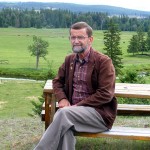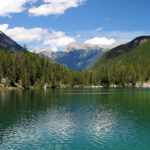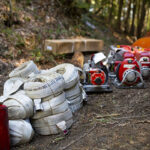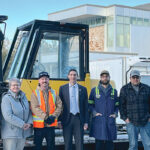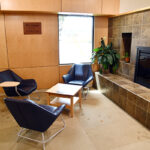Home »

The long, dusty road to Dembi Dolo
Crowded like sardines in a tin, a sweaty but eager, collection of volunteers from the Tri-Cities area packed into a four-wheel drive Land Cruiser for the last leg of their long journey to Dembi Dolo, a small African village half way around the globe in western Ethiopia.
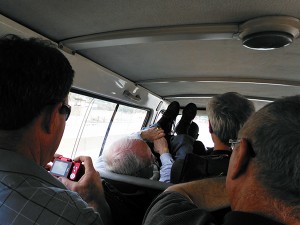 The group led by Dr. Jim Guzek, an ophthalmologist at the Pacific Cataract and Laser Institute (PCLI) in Richland, Wash., and a member of the Tri-Cities Sunrise Rotary Club, was about to spend a week at a Rotary-sponsored eye camp in the isolated rural village where Guzek and his Ethiopian ophthalmologist partner, Dr. Samuel Bora, would hopefully perform close to 200 cataract surgeries at a nominal charge for blind Ethiopians that otherwise had no hope of seeing their loved ones again nor seeing the green, hardscrabble, countryside that nourished them.
The group led by Dr. Jim Guzek, an ophthalmologist at the Pacific Cataract and Laser Institute (PCLI) in Richland, Wash., and a member of the Tri-Cities Sunrise Rotary Club, was about to spend a week at a Rotary-sponsored eye camp in the isolated rural village where Guzek and his Ethiopian ophthalmologist partner, Dr. Samuel Bora, would hopefully perform close to 200 cataract surgeries at a nominal charge for blind Ethiopians that otherwise had no hope of seeing their loved ones again nor seeing the green, hardscrabble, countryside that nourished them.
Also with the team were two optometrists from the Tri-Cities area; Brian Johnson of PCLI and Gerald Wodtli of the Pasco Vision Center who would see hundreds of patients themselves for a variety of eye ailments that didn’t require surgery. The rest of the volunteers were made up of other Tri-Cities Rotary members and one Canadian, a Rotarian and retired journalist from Cranbrook, B.C. The volunteers were a diverse lot including a translator, an insurance salesman, a home builder, a scrub nurse, a former U.S. Navy Seal and a school district rep, but they all shared one thing in common — an intense desire to make a difference in a country where almost any difference would be a step forward.

One difference that quickly became apparent to the intrepid crew was that the climate in Ethiopia quickly improves with altitude. About two hours after leaving steaming Gambella on the banks of the Baro River, the Toyota Land Cruiser started up a series of switchbacks that took us up to almost 6,000 feet in the Ethiopian highlands where the temperature dropped at least 10 degrees and we saw baboons swinging through the tropical forest that lined both sides of the rocky road that cut a narrow streak through the red, Ethiopian soil. We also saw electrical lines laying on the ground, a fact that would become more significant to us later and soon we began to pass through an almost continuous series of tiny, farming villages with mango and banana trees hanging over the tin roofs and large cleared fields of stubble behind the houses, that once the monsoon rains started to fall, would be planted with teff, a millet-like grain indigenous to Ethiopia.
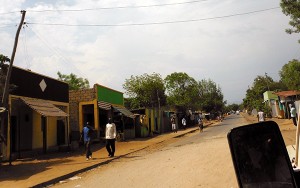 The sky darkened as we neared Dembi Dolo and soon rain began to fall as a big tropical thunderstorm broke with lightning flashing and torrents of warm rain falling to the ground. It was a welcome rain because the highlands were still locked in the dry season which lasts from October to early May. The storm was an early harbinger of more numerous storms to come and lasted less than an hour with only a few drops falling as we pulled into Dembi Dolo and went directly to the Daughters of Charity convent which would be our welcome and secure nest for the next seven days and where we met the indefatigable Sister Evelyn, who would be like a Fairy God Mother to us seeing that we were well fed, well rested and even provided with entertainment during our all too short stay. She also showed us a giant Wanza tree that she called her “Avatar tree” that thrust upwards just outside the walls of the convent and was home to a pack of monkeys that jumped from one sinuous branch to another in the early evening hours.
The sky darkened as we neared Dembi Dolo and soon rain began to fall as a big tropical thunderstorm broke with lightning flashing and torrents of warm rain falling to the ground. It was a welcome rain because the highlands were still locked in the dry season which lasts from October to early May. The storm was an early harbinger of more numerous storms to come and lasted less than an hour with only a few drops falling as we pulled into Dembi Dolo and went directly to the Daughters of Charity convent which would be our welcome and secure nest for the next seven days and where we met the indefatigable Sister Evelyn, who would be like a Fairy God Mother to us seeing that we were well fed, well rested and even provided with entertainment during our all too short stay. She also showed us a giant Wanza tree that she called her “Avatar tree” that thrust upwards just outside the walls of the convent and was home to a pack of monkeys that jumped from one sinuous branch to another in the early evening hours.

After the initially dusty then muddy and cramped four-hour road trip to Dembi, we were all pretty tired and didn’t spend too much time talking after a hot meal that featured vegetable soup followed by spicy meat dishes, flat-bread and rice as well as fresh bananas and mangos for dessert. There was also dark, Ethiopian coffee from nearby plantations and even a cold soda or beer if you wanted. The Daughters of Charity for all intents and purposes were angels as far as we were concerned, but that didn’t stop these angels from knowing what goes down awfully well after the end of a long African day on the road.
I slept like a baby that first Dembi Dolo night and the next morning I tucked into a great breakfast with a bowl of creamy African porridge, flatbread pancakes, mango jam and that marvelous aromatic coffee. Then we jumped into the Land Cruiser again and drove past a long line of boisterous children walking to school as we proceeded to the clinic.
By the end of that day I began to appreciate what this dedicated team of physicians, optometrists and volunteers from America were accomplishing in one of the most undeveloped parts of the world.
Lead image: Volunteers relaxing before breakfast at Daughters of Charity convent.
– Gerry Warner is a retired journalist and Cranbrook City Councillor. He recently volunteered at a Rotary eye camp in Dembi Dolo, Ethiopia.
